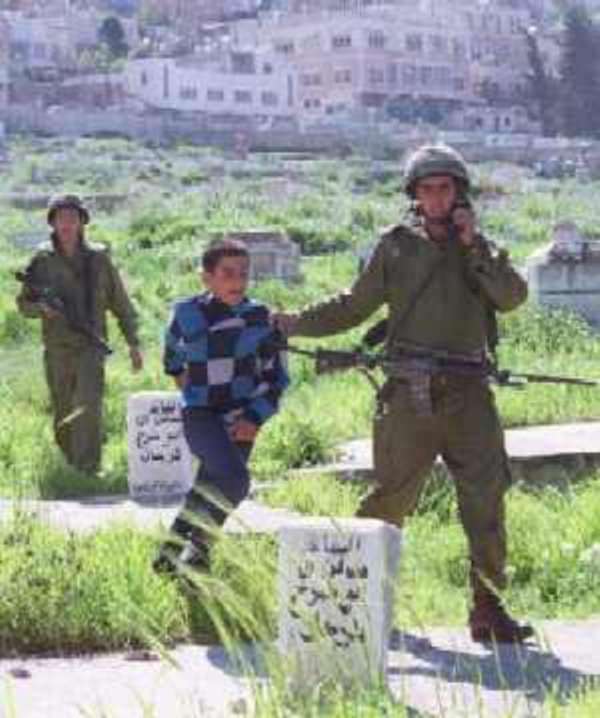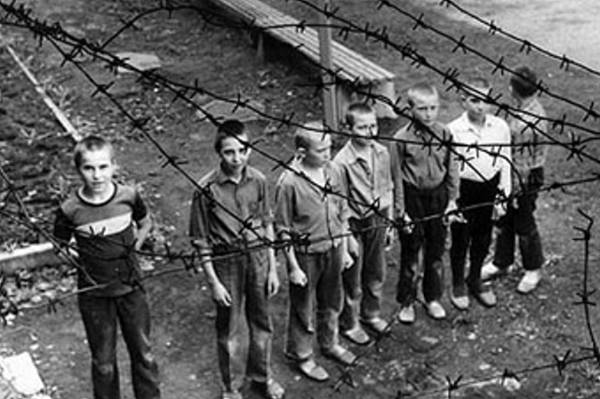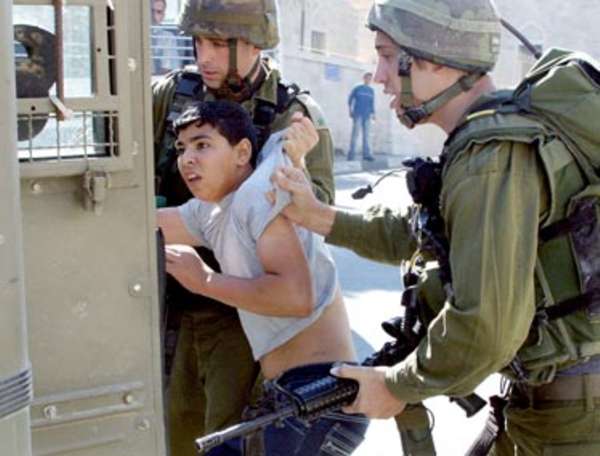
september 2004

A freed child detainee: “It's a nightmare
I can never forget”
Saed Bannoura-IMEMC & Agencies, August 14, 2004
Rakan Nusseirat, 13 years old child from Jericho , who was detained in Ofer detention camp, near Ramallah, north of the West Bank for nearly three months, is considered the youngest detainee in Palestine since he was arrested when he was only twelve years old.
Nusseirat was arrested September 28, 2003 and released December 11, 2003 after his second attempt of suicide as a result of the continuous suffering and psychological problems he encountered in detention.
“It's a nightmare…It's a nightmare which I can never forget or free myself from”, Rakan said, while receiving treatment and rehabilitation in the "Childhood Center ” which belongs to the Ministry of Social Affairs.
Psychologists in the center said that harsh events are usually recorded in the memory of the detainee, especially being a child; it needs time and good care to adjust and start to respond to psychological aid depending on the period the detainee spent in detention and sorts of torture he encountered.
Medical reports revealed that Nusseirat is suffering from several symptoms, such as difficulties in breathing, nightmares, shivering, depression, insomnia, and anger, in addition to physical pain in his legs and his left thigh after being beaten by a soldier.
Rakan prior to his release was hospitalized in Hadassah Hospital in Jerusalem after suffering from several symptoms and anxiety attacks as a result of the continuous threats and torture imposed on him.
On October 7, 2003, a military court rejects the lawyer's request to free him and was imprisoned for additional week, and in November 14, 2003, the court decided that he should be transferred to a “proper detention camp” after all central prisons refused to accept his because of his age.
The court's decision was never implemented and Rakan remained in “Ofer” detention despite the testimony of an Israeli doctor about his bad condition, after examining him,
“The child should be sent to a center for minors, his life in danger, he cannot remain in this detention since he needs special care”, the doctor said.
Yet, he remained there until he was released.
Rakan is not the only child, who suffered from detention, there are 480 child detainees in the Israeli detention camps, and they all suffered from torture; physical and psychological, all were threatened to be killed if they don't “confess”.
Army, and against all laws and regulations, continued its violations to the International Law, and International agreement concerning the rights of children, especially article number 37 in the International Agreement of Children Rights;
United Nations
Convention on the Rights of the Child (CRC), article 37,
"The arrest or imprisonment of a child shall be
in conformity with the law and shall be used only as a
measure of last resort and for the shortest appropriate
period of time. "
Children of
Political detainees:"Let us hug our parents"
August 17, 2004
The Legal Center for Arab Minority Rights in Israel -
Adalah, filed a petition on Monday, demanding the Israeli
high court to issue an order of injunction instructing
the "Israel Prison Authority" (IPA) to allow
the children of prisoners classified by the IPA as
security prisoners to have physical contact with their
parents during prison visits. In the petition, Adalah
attorney Abeer Baker argued that the IPA's decision of
2002 to deny physical contact between children and their
incarcerated parents is illegal, as the IPA is not
authorized to introduce such limitations on family
visits.
"The decision infringes the constitutional right to
dignity; violates the child's right to receive love from
both parents; contradicts and neglects the principle of
acting in the best interests of the child; is
discriminatory; and constitutes illegal and collective
punishment", Baker said. Adalah further argued in
the petition that the IPA's decision gravely harms the
right of prisoners with children to equality and dignity,
as well as their right to family visits, and therefore
should be canceled. The Israeli Prison Authority,
cancelled two years ago, an order which allows children,
below the age of 10, to have physical contact with their
detained parents during visitation.
According to the law, Adalah added, "any prisoner
and detainee is entitled to receive family visits",
nevertheless, visitations are conducted with a glass wall
separating the prisoners from their children and any
other visitors.
"The Israeli prison authorities started limiting
physical contact between prisoners classified as security
prisoners and their children in May 2002, after an
alleged attempt by a child to smuggle a proscribed object
to his imprisoned father", Adalah added. Preventing
the detainees from having physical contact with their
families, contradicts the International law and the
Israeli law which is applied and effective on prisoners
detained fro criminal charges.
According to Article 9(3), of the Convention on the
Rights of the Child (CRC), "State parties must
respect the right of children separated from one or both
of their parents to continue engaging in a personal,
direct, and physical relationship with them".

UPDATE............ GUARDIAN Aug.28.2004
................The conditions in the prisons cannot be believed. The facilities in which juveniles are held are exceptionally bad. In Megiddo and Ketziot military prison camps, which are run by the Israeli army, children are treated as adults and held in threadbare tents which offer little protection against freezing winters and scorching summers. Bedding consists of wooden pallets covered by a thin mattress, and there are four toilets and two showers for every section in which about 120 detainees are held. A young woman, Su'ad Ghazal, was punished for writing details about the terrible prison conditions in a letter to a French human rights organisation.
Palestinian children are also detained in the Telmond Compound and Ramle Women's Prison, administered by the Israeli prison service, where they are locked in their cells for hours on end with, in some cases, only 45 minutes outdoor exercise allowed every two days. Many are forced to sleep on the floor due to overcrowding. Windows are boarded up with iron panels, which block out the light and intensify the heat in the rooms. The prison guards routinely and arbitrarily beat and humiliate Palestinian detainees.
Though these are all political prisoners - held by foreign military occupiers - this hunger strike is not a political strike. The 2,269 prisoners who began the strike were asking for humane conditions, such as the cessation of public strip searches, the ability to use the telephone, to be able to see their families, and an end to arbitrary and indiscriminate beatings. These are not privileges or favours. The prisoners want the authorities to respect internationally recognised rules governing imprisonment. The minimum standards can be found in articles of the 1949 Geneva conventions, which should be applied to prisoners in occupied territories. Now more than 4,000 prisoners have joined the strike.
How have the Israeli authorities responded to this appeal by Palestinian prisoners to be treated as human beings? When the strike entered its second week and the prisoners began to fall ill, the Israeli health minister, Danny Naveh, refused to allow them access to prison hospital facilities. "Let them be treated where they lie ... we don't want these murderers in hospital," he said.
The Israeli public security minister, Tzahi Hanegbi, announced to the press: "They can strike for a day, a month, until death. We will ward off this strike and it will be as if it never happened." He has ordered large, open grills to be set up to barbecue meat and for bread to be baked just outside the prison doors, to torture prisoners with the smells. Prison guards are encouraged to eat all this in front of the fasting prisoners. On August 13 Hanegbi announced that, as far as he was concerned, the prisoners could "starve to death".
When similar savage images and stories emerged from Abu Ghraib prison in Iraq, they turned the stomachs of those in the west who saw them. The international outcry was immediate and profound. Now the activities of another liberal democracy's occupying forces are on public display, yet the collective silence, and the complicity of the British and American press in not covering it, astonishes and bewilders Palestinians everywhere.
Worse, the prisoners' predicament inside Palestine is simply a microcosm of the Palestinians' predicament outside the prison walls; for what the Israelis are doing to the prisoners inside their prisons they are doing to Palestinians everywhere - in their land and off it. The collective punishment, the contempt, the daily robbery - the prison gates are everywhere.
The roasting of meat in front of a starving person is little different from the current expansion of huge new illegal settlements on occupied Palestinian land, areas green from expropriated water, while Arab crops die of thirst. These settlements sit above the Palestinian refugee camps and towns, each cut off from the other by checkpoints, curfews and closures - with jobs lost, and soaring new levels of poverty and malnutrition that have shocked the already exhausted humanitarian agencies in recent months. The prison system is no different for Palestinians who are trapped just a few miles north of Israel. In south Lebanon, at Rashidyeh refugee camp, a lively group of young women told me a few weeks ago: "When we leave school, there are no professions open to us here [more than 72 professions in Lebanon are denied to Palestinian refugees], we are prevented from going home, we have no travel documents, we cannot study at the university here. Our lives are over, we can't even leave the camp."
This is, perhaps, the most difficult moment that Palestinians have had to face. It is essential for those who care for peace and justice to show solidarity at this time with our struggle for emancipation. It is the moment to speak up, to remind those in power that until Palestine is free, citizens all over the world are not living in democracies either. It is the moment to make direct and practical gestures of support and to connect with those holding fast to their dignity..................
· Karma Nabulsi is a research fellow at Nuffield College, Oxford and the author of Traditions of War: Occupation, Resistance and the Law
